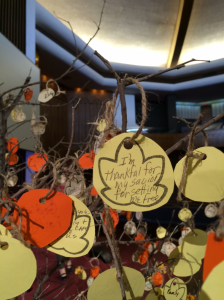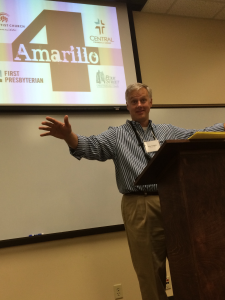 God caused the great tragedies to Job and his family, right? You know that, right? God did it. Scripture is plain that God had been protecting Job from evil and suffering. The devil couldn’t do anything bad to Job because God had put this fence around him. Satan knows if he’s going to inflict disaster on Job, God has to act. God has to remove his protection. And he asks God to do just that.
God caused the great tragedies to Job and his family, right? You know that, right? God did it. Scripture is plain that God had been protecting Job from evil and suffering. The devil couldn’t do anything bad to Job because God had put this fence around him. Satan knows if he’s going to inflict disaster on Job, God has to act. God has to remove his protection. And he asks God to do just that.
“Stretch out your hand and strike everything he has!” the devil says to God in Job 1:11. And God agrees to hand the keys over to Satan. “Very well then, everything he has is in your hands, but on the man himself do not lay a finger.” (1:12)
God is definitely responsible for what happens to Job. God had to act to allow all the death and destruction to happen. The devil and God and Job himself all acknowledge that God is in control of everything happening to this faithful servant. God gave the devil the power and the permission to torment this righteous man. But God never for a second gave up control. He places strict limits on the devil. Satan doesn’t lay a finger on Job himself because he can’t. God’s not allowing it. Later on, God allowed even some physical suffering for Job but told the tormenter he couldn’t kill him. And he didn’t. Because he couldn’t. God was totally in control.
Please note that suffering for Job began only when God allowed it. And the trouble for Job ended the moment God decided to end it. God was always totally in control of Job’s whole situation.
I think it should be a great comfort to us to know that God is in control of our suffering. God reigns supreme over all of your troubles. He’s totally in charge of what’s happening to you right now. Now, if God were a malicious tyrant, that would be scary. But he’s not. He loves you, remember?
So… if he loves me, why does he allow me to suffer so much?
Well, God has a goal for his people. He has an eternal plan for you. His plan for all of us is communion with him. And our earthly happiness isn’t necessarily a part of that goal. God is much more interested in our faith than our pleasure. He’s committed to sharing holy community with us forever. That’s his intent. That’s what he’s doing. And if God is totally sovereign over everything — if nothing happens without God’s permission — then every single thing that happens serves his goal. And if our temporary pains and struggles serve God’s eternal goals, then he uses it.
“And we know that in all things God works for the good of those who love him, who have been called according to his purpose. For those God foreknew he also predestined to be conformed to the likeness of his Son.” ~Romans 8:28-29
We’re all being transformed into the likeness of Jesus. That’s the purpose, that’s the goal. We’re being changed, we’re being saved. And God uses everything that happens to us — all things — for this goal of holiness, for this purpose of being made into the image of Christ.
Romans 8 doesn’t say, “Yes, you may have lost your job, but you’re going to get an even better one soon because all things work out for good.” It doesn’t say, “Don’t be upset that your girlfriend broke up with you; God must have an even better girl, your future wife, waiting for you just around the corner!” When we interpret “works for the good” that way, it’s very narrow and often materialistic. It’s a worldly application. From God’s perspective, “good” has to be defined spiritually, eternally. The ultimate “good” is your saving relationship with him. So Romans 8 doesn’t say every difficult experience is going to lead to something good in this life. The “good” God may have in mind might involve the next life entirely. God uses suffering to build Christian character to conform us to Christ and to prepare us for that final glory. Knowing our God is in control of our sufferings and that he uses those sufferings should shape our view of those sufferings more into God’s perspective.
“We rejoice in our sufferings because we know that suffering produces perseverance; perseverance, character; and character, hope. And hope does not disappoint us because God has poured out his love into our hearts by the Holy Spirit, whom he has given us.” ~Romans 5:3-5
Hope tells us that our suffering is not in vain. It’s not pointless. God is in total control of everything happening to you right now and he’s using it to his glory and to his eternal purposes for you and for his world.
Peace,
Allan











Recent Comments